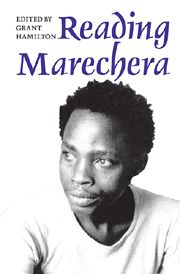Book contents
- Frontmatter
- Contents
- Notes on Contributors
- Introduction
- 1 A Brotherhood of Misfits
- 2 Blowing People's Minds
- 3 Grotesque Intimacies
- 4 Tracing the Stain in Marechera's ‘House of Hunger’
- 5 Menippean Marechera
- 6 Black, But Not Fanon
- 7 The Avant-Garde Power of Black Sunlight
- 8 Classical Allusion in Marechera's Prose Works
- 9 Revisiting ‘The Servants' Ball’
- 10 Marechera, the Tree-Poem-Artifact
- Bibliography
- Index
9 - Revisiting ‘The Servants' Ball’
Published online by Cambridge University Press: 05 April 2013
- Frontmatter
- Contents
- Notes on Contributors
- Introduction
- 1 A Brotherhood of Misfits
- 2 Blowing People's Minds
- 3 Grotesque Intimacies
- 4 Tracing the Stain in Marechera's ‘House of Hunger’
- 5 Menippean Marechera
- 6 Black, But Not Fanon
- 7 The Avant-Garde Power of Black Sunlight
- 8 Classical Allusion in Marechera's Prose Works
- 9 Revisiting ‘The Servants' Ball’
- 10 Marechera, the Tree-Poem-Artifact
- Bibliography
- Index
Summary
The concerns of this chapter are threefold. First, it highlights the fact that Dambudzo Marechera's play ‘The Servants' Ball’ is the only known artistic work in Marechera's oeuvre written in his mother tongue, Shona. Second, it shows how Marechera's play is situated in the context of the newly independent Zimbabwe of the early 1980s. And, finally, this chapter explores how the ‘discovery’ of Marechera's only Shona work resurrects the ‘ghost’ of the debate over the ‘appropriate’ language of African literature.
For many Zimbabweans, it is not necessary to have read The House of Hunger or Mindblast to know Dambudzo Marechera. He is public property. For the teenage reader, the name Dambudzo Marechera is synonymous with rebelliousness. For the many writers across Zimbabwe, the name evokes razor sharp brilliance. There is the mental image of the stubborn, dreadlocked man furiously writing, and writing, and writing. The youngsters often wish that they are him – that they have his vision, language and charisma. However, when one has worshipped Marechera like this, one begins to wonder if he ever wrote in his mother tongue. Such absence in his literary production is made glaring by the fact that some of Marechera's contemporaries and friends, like Charles Mungoshi, Musaemura Zimunya and Chenjerai Hove, have actually written convincingly in both English and Shona and, moreover, won prizes in both languages.
- Type
- Chapter
- Information
- Reading Marechera , pp. 157 - 171Publisher: Boydell & BrewerPrint publication year: 2013



